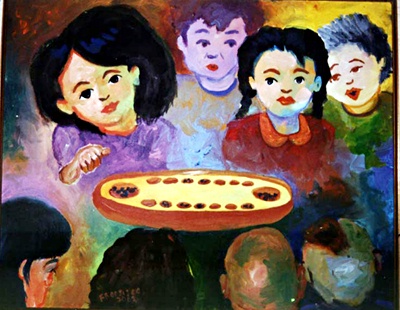All Nonfiction
- Bullying
- Books
- Academic
- Author Interviews
- Celebrity interviews
- College Articles
- College Essays
- Educator of the Year
- Heroes
- Interviews
- Memoir
- Personal Experience
- Sports
- Travel & Culture
All Opinions
- Bullying
- Current Events / Politics
- Discrimination
- Drugs / Alcohol / Smoking
- Entertainment / Celebrities
- Environment
- Love / Relationships
- Movies / Music / TV
- Pop Culture / Trends
- School / College
- Social Issues / Civics
- Spirituality / Religion
- Sports / Hobbies
All Hot Topics
- Bullying
- Community Service
- Environment
- Health
- Letters to the Editor
- Pride & Prejudice
- What Matters
- Back
Summer Guide
- Program Links
- Program Reviews
- Back
College Guide
- College Links
- College Reviews
- College Essays
- College Articles
- Back
Growing Up With Not One, But TWO Russian Immigrant Parents
My sister and I both have had the absolute pleasure of being raised in a household where not only one, but both parents spoke Russian. They, along with their families, moved from Russia in 1992. In doing so, they have brought many wonderful traditions and customs that have enhanced my experience as a child in 21st century America.
Let’s start with the language itself. Russian was created by a Byzantine priest. He took the dialect of the natives in modern-day Russia, and mixed them with Greek, the official language of Byzantium. It is one of the most elegant languages, for the words sound like a donkey on the toilet after eating Taco Bell’s Triple Dare Devil Loaded Grillers. A typical conversation might sound like this.
Mother: “Maxik, idi suda!”(Translation: Max, come here.)
Max: “Chto ti hochesh?”(Translation: What do you want?)
Mother: “U nas budiet obed v chiest dedushki”(Translation: We will have dinner for your grandpa.)
Max: “A pachimoo eta nughna? On starenkiii.”(Translation: Why? He’s old anyway.”)
Mother: “Ti shto, debil? Emey sovest.” (Translation: Are you kidding me? Show some decency!)
See! A conversation about a party for your grandfather only sounds like World War III is about to drop harder than your Russian grandmother’s pots and pans when she finds out that you didn’t finish your food.
Russian food is special. It leaves you poking at this slab of meat and cabbage that somehow moves, wondering when it will grow fangs. Because in Soviet Russia, food eat you. And of course, you must eat all of it. There is no such thing as “I’m full” or “Stop shoving this chicken down my throat before I regurgitate it”. You cannot even say “Thank you”. The only acceptable term is “More, please.” In addition to that, Russian families emphasize the importance of Russian food above all, so you eat these types of meals every day, and nothing else. I remember a crisp, fall afternoon in 2007 where I went over to my best friend’s house for the first time. We had lunch, and I questioned the icky purple gel mashed with a brown substance, both placed in between bread, with the crusts off. I, as a tiny 7 year old, had never seen a peanut butter and jelly sandwich. But that is okay! Golubtsi (stuffed cabbage that is occasionally orange) and Borsch and Katleti (Chicken Cutlet) and Frikadelki (Russian meatballs) always prevail over lame sandwiches!
In Russian families, the most important thing is camaraderie and love, right? WRONG! Grades and schoolwork are the top priority. Come home with a failing grade, and you win yourself long nights full of extra workbooks. Failing grades are as follows:
Science: 100% or below (You must be a doctor!)
Social Studies: 95% or below
Foreign Languages other than Russian: 90% or below
English: 100% (“It is not that hard, you speak it better than me!” - Every Russian parent ever)
Math: 105% (In Russia, your grandparents, and their parents, and their parents, and their parents were all engineers and architects! Math is a must! Essential to survival!)
Overall, growing up in a Russian family has allowed for many unique opportunities, different than that of American children. Through my childhood, I have learned many skills, such as having to explain to my friends why I can’t go out due to upset stomachs, or why I sound like I am dying when I am on the phone with a relative. Thanks to my family, I am a better person.

Similar Articles
JOIN THE DISCUSSION
This article has 0 comments.

I love my family very much, but living in a crazy house like mine affects me a LOT.